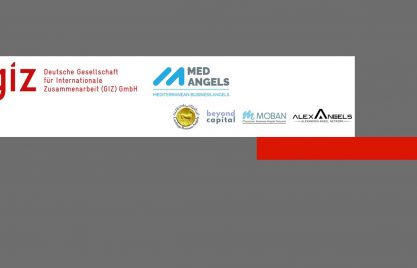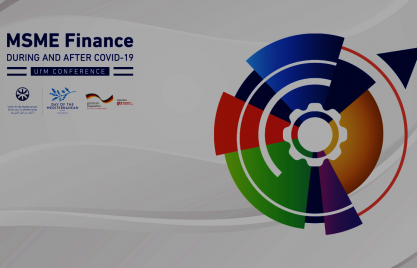GIZ’s first Spring Academy on ‘Financial Systems 4 Development’ hosted 26 staff from 11 countries in Berlin to boost their know-how about developing and leveraging financial sectors for the achievement of development goals.
“The sharing of knowledge and experience about developing financial systems is crucial and needed to boost sustainable economic development in our partner countries. By being here, you join this mission,” highlighted Natascha Beinker, Deputy Head of the Division, Cooperation with the Private Sector / Sustainable Economic Policy at the BMZ, during the launch of the Spring Academy.
Hayder Al-Bagdadi, Head of GIZ’s Sector Network Sustainable Economic Development MENA and Projects for Financial Inclusion and SME Finance, emphasized the importance of this in-house training to foster synergies and enhance the knowledge about tested and proven approaches and tools in Financial Systems Development (FSD) relevant for sustainable development across multiple sectors.
The Spring Academy Financial Systems 4 Development (FS4D), held from March 18–21, 2019 in Berlin, is the first of its kind and a joint effort by GIZ staff engaged in the network for Financial Systems Development in MENA and the Academy for International Cooperation (AIZ). The piloted training aimed at increasing the understanding of the landscape, players, instruments and approaches in FSD and of aspects that can be helpful in achieving their project’s and partners’ development goals. It addressed GIZ staff working in areas outside of FSD or having freshly joined an FSD programme.
“We need to understand the financial ecosystem of the country we are working in and what motivates each stakeholder so we can align the interests and come up with something that would work. Each country in MENA is unique,” concluded a participant.
Joining from headquarters and 10 countries from Sub-Sahara Africa and the MENA, the 26 participants represented projects from diverse sectors ranging from agriculture and environment to the cooperation with the private sector. A total of 21 international experts, GIZ guest speakers, think tank, and start-up representatives enriched the quality of the course contents delivered.
The knowledge and practical field examples shared among colleagues covered a total of 12 distinct modules. Through a mixture of lectures, case studies, group exercises and an excursion, the participants had the opportunity to learn and exchange about FSD essentials ranging from an historic introduction, Agricultural Finance, Financial Inclusion, Digital Finance, Green Finance, to Inclusive and Climate Insurance as well as Investment Readiness.
“Digital Finance holds huge opportunities for digital inclusion and financial system deepening – but there are also a lot of challenges and downsides to it: We need to work on digital literacy, we need to bridge the gap between innovative technical solutions and the specific needs within our partner countries, we need to keep an eye on trade-offs and long-term negative effects,” concluded another participant after the training.
A highlight of the 4-day Spring Academy was the excursion to GIZ’s Blockchain Lab at the ‘Impact Hub Berlin,’ a center for social innovation. At the creative co-working space, participants had the chance to explore applications of Financial Technology by engaging with innovators, start-up entrepreneurs, and experts. In groups they addressed challenges in Agricultural Finance, Alternative Finance, Digital Identification, Forced Displacement and Start-up Finance in a creative setting, pitching their proposals to a ‘Partner Jury’.
The Academy was rounded up by a concluding session aiming at knowledge transfer, when participants had the opportunity to engage in rounds of collegial advice within the topics presented in the week-long programme in form of table discussions. By sharing their questions and challenges, colleagues delved into the peer-learning about the ‘Know-how’ in capitalizing on or facilitating financial systems for development in practice.
“Leave your silos and talk to the infrastructure colleagues, the climate colleagues, to foster matchmaking with potential financing sources!” Wolfgang Bücker, head of the Sector Programme FSD concluded on the fourth and last day.
With its mixture of class-room lectures and hands-on exercises, the Spring Academy FS4D provided an insightful and inspiring environment for learning as well as the exchange of knowledge and experience among participating colleagues active in different sectors and countries. The identified demand for interdisciplinary exchange and the active engagement that unfolded during this pilot training hold promise for a very bright future of an annual comeback of GIZ’s Spring Academy on FS4D.



